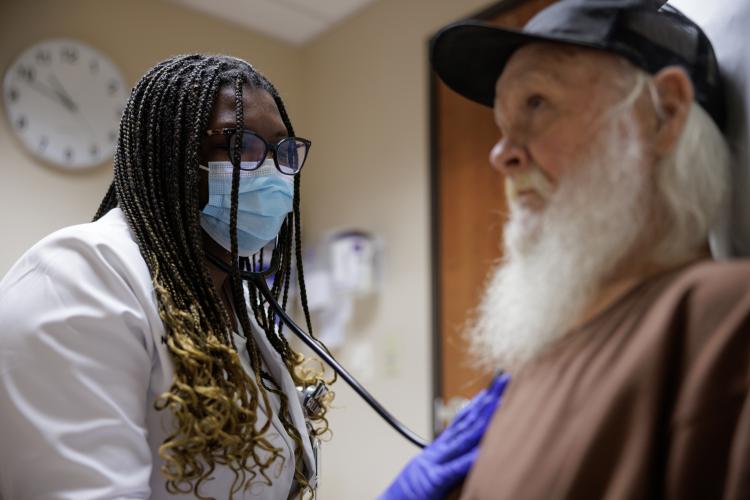
Dr. Nnyekaa Collins, MD is a geriatric medicine physician at Magnolia Health center. She spends time caring for our geriatric population and promoting healthy aging.
Tips for healthy aging with Dr. Collins
With each passing day, we are all growing older. We watch the people around us age and possibly find discomfort in the idea that someday we will be considered "old" too. However, growing older is not equal to thoughts of illness, limitations, or isolation.
Growing older is a beautiful encapsulation of our lives and memories. As we age, we must prioritize our health and make decisions that support our bodies. Dr. Collins provides insight into how to turn aging into a positive experience. She offers tips, guidance, and humor to combat the daunting feeling of getting older.
Here are the four tips she shares for healthy aging:


1. Establish a strong relationship with your Primary Care Physician (PCP)
Having a PCP that you trust and relate to also means having someone with whom you can discuss changes in your life as your body ages. When patients establish a healthy relationship with their physician, they can better maintain their health.
The JPS Podcast covers an episode on the necessity of having a PCP. To coincide with Dr. Collins' tip, Dr. Robert Richard, DO, Family Medicine, uncovers the care patients with PCPs receive.
To connect with a primary care physician at JPS, visit Primary & Pediatric Care | JPS Health Network
2. Create a diet regime fit for your lifestyle
Our expert recommends avoiding:
- Prepackaged or processed food
- Overeating
- Food high in sodium content
- Added sugars
Eating foods that are high in sodium or sugar without reducing your daily intake can lead to the formulation of chronic diseases. For example, those consuming a large amount of sodium may find that they are suffering from high blood pressure. Likewise, those with a high sugar intake may be more susceptible to developing diabetes.


3. Participate in physical activity
Dr. Collins admits that some activities become harder as we age. However, you're never "too old" for exercise! There are activities that are safe and enjoyable for groups of all ages.
Dr. Collins suggests finding the fit that's right for you. You may enjoy activities such as:
- Dancing
- Swimming
- Yoga
- Water aerobics
- Walking
- Biking
4. Invest in your sleep schedule
Adequate sleep is arguably one of the most important parts of caring for our bodies as we age. Sleep has a direct correlation to the health of our brains, and practicing restless habits may be affecting your physical and mental health.
Try adopting these routine practices for a good night's sleep:
- Lower home temperature close to bedtime
- Keep your room dark and quiet
- Avoid screen time before bed
- Avoid using the bedroom space for activities other than sleeping
- Establish a consistent time to begin winding down
It's never too early
Now that we've been given some tips to help us age healthily, we must ask ourselves, "So, when should I start?" The simple answer is that we should start creating these habits and routines now – it's never too early (or late)!
Dr. Collins says, "It's important to start this as soon as possible. If you're young, adopting healthy habits now can make them easier to sustain over a lifetime. If you're older, know that it's never too late. Start small and implement minor changes. You can always build on that."
Checking in on our loved ones as they age
The support we offer for older adults is just as important as the support we give ourselves. Building community is essential; life was not made to be lived in loneliness.
Here are some things you can do to help support the others around you:
Be aware of generational gaps – We are living in a time when people rely on various communication tools. Understanding that a call or text message may not hold the same significance to older generations is important. Consider dropping by for a visit in person more frequently!
Ask questions and prompt conversations – Not everyone finds it easy to ask for help. For some, it is pride, unawareness, or anxiety. Regardless of the reasoning, offering assistance to others rather than waiting for them to ask may be the push they need to connect with care.




